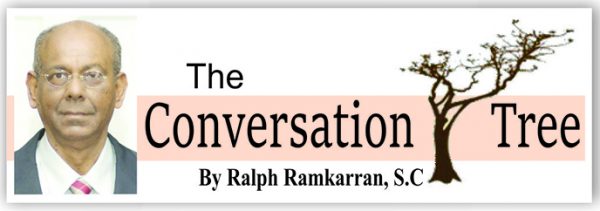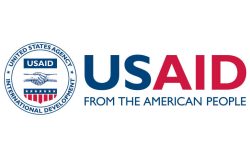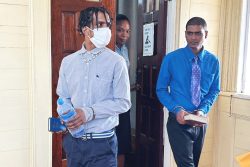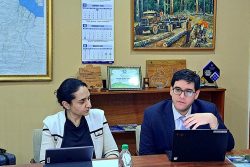By this time, the year of the half person would have passed. It took three courts to finally resolve this jurisprudential conundrum. The argument advanced to overturn the no confidence vote of 33/32 against the Government on 21 December, 2018, was that while mathematically, half of 65 members of the National Assembly is 32½, the existence of such a number of persons is an impossibility. So is adding a half person to 32½ to make 33. To arrive at the half of 65 persons, 32½ persons have to be rounded up to 33 persons and 1 whole person added. Hence, the majority of 65 is 34 and not 33. Justice Wit of the CCJ resolved the conundrum with a compelling argument – you know it when you see it, 33 is the majority of 65.
 The year of the half person had been presaged by other surprising developments. The “Shyamalan” syndrome, had taken hold of many. M. Night Shyamalan is a US filmmaker specializing in thrillers. In rejecting three lists of nominees by the Leader of the Opposition for Chair of GECOM, the then President proceeded to unilaterally appoint James Patterson, an 80+ year old former Judge, having already dismissing two 80+ year former judges from offices they had held on the ground of their ages. The CCJ eventually ruled that the President’s appointment was unconstitutional but that nothing precluded discourse between the Opposition Leader and the President of potential names, which the President may even suggest. The President, gripped by the Shyamalan syndrome, submitted to the Leader of the Opposition, whose role he usurped under the Constitution, a list if six names for consideration as chair of GECOM, to the befuddlement of the nation.
The year of the half person had been presaged by other surprising developments. The “Shyamalan” syndrome, had taken hold of many. M. Night Shyamalan is a US filmmaker specializing in thrillers. In rejecting three lists of nominees by the Leader of the Opposition for Chair of GECOM, the then President proceeded to unilaterally appoint James Patterson, an 80+ year old former Judge, having already dismissing two 80+ year former judges from offices they had held on the ground of their ages. The CCJ eventually ruled that the President’s appointment was unconstitutional but that nothing precluded discourse between the Opposition Leader and the President of potential names, which the President may even suggest. The President, gripped by the Shyamalan syndrome, submitted to the Leader of the Opposition, whose role he usurped under the Constitution, a list if six names for consideration as chair of GECOM, to the befuddlement of the nation.
Time passed, election fever gripped Guyana and the Shyamalan syndrome infected more people. Hysteria gripped some. The PPP was accused of seeking to rig the elections. No matter the changes in the world since the heyday of communism, the Government sought to exploit the old connection between the PPP and the Russians and the historic fear of the “Reds under the beds.” Two Russians, armed with no electronic equipment, were “exposed” as trying to penetrate the elections system and aid the PPP in its nefarious objective. They were promptly expelled from Guyana. If Government circles thought that they could use the old Cold War trope to influence the Americans, they forgot that President Trump and President Putin are the best of friends. It was their expulsion of the Russians that may have influenced President Trump to take a stronger line against APNU+AFC’s rigging of the elections. Does anyone remember that it was after the Russian fiasco that Secretary Pompeo became more vocal in relation to Guyana?
Then came the Shyamalan twist. We have all heard about black magic, events of horror. The now well-known Clairmont Mingo, head of District 4 in the elections, was thwarted by the court in his use of a spreadsheet instead of Statements of Poll to count the votes of Region 4, as required by law. So he invented the reverse version of black magic – white magic. To everyone’s horror, Mr. Mingo deployed a white bedsheet upon which were displayed invisible numbers representing the election results.
Everyone in Guyana knows that in elections, only valid votes can be lawfully counted. In fact, the British TV programme “Trail of the Vanishing Voter” in 1968 about Guyana’s elections, traced the disappearance of valid voters. President Trump, no doubt having learnt of this concept from Guyana’s history, solemnly, if unnecessarily, validated in 2019 by the CCJ, is insisting that it be applied in the US and that, if applied, the results will show that he won the election. If President Trump succeeds in the US, he has not only the CCJ, APNU+AFC and Keith Lowenfield to thank, but the guidance of academics, trade unionists and others who urged APNU+AFC to ignore overseas observers, international opinion and the recount.
The constitutionality and lawfulness of the recount order, based on laws which the APNU+AFC previously agreed to, is being challenged in court by its agents or supporters. Of the case I can say little. But I can say that in 1996 the PNC supported a law for Voter ID cards. In 1997, after it lost the elections, it challenged the constitutionality and lawfulness of the Voter ID card law, which had been held to be lawful in Jamaica under a similar constitution to Guyana’s. But the Guyana court held the Voter ID law to be unconstitutional. The case is popularly known as the Esther Perreira case. A tried and tested operating principle of APNU+AFC is to agree to something and when it doesn’t work in its favour, to disagree with it. The list is long and growing: Philomena Sahoye as Mayor, the voter ID law, Region 8 sharing of Chair and Deputy, now the recount order law.
I wish my readers, the Stabroek News management and staff and all Guyana a productive and successful New Year.









